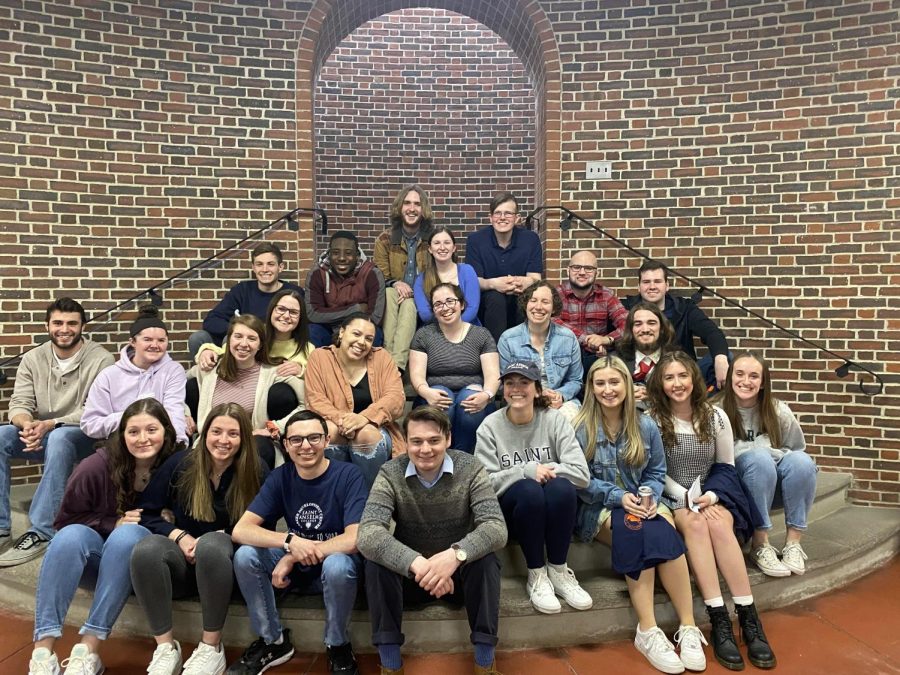Students speak their minds at first ‘Synod on Synodality’
Synod participants spent time in productive, respectful conversation about important topics at Saint A’s and the greater Church
Students from the Saint Anselm College community came together to discuss themes of community, faith, and inclusivity in a universal Synod on Synodality. A synod is a permanent council of bishops that serves to advise the Pope on different issues. Synodality means “walking together.” The Synod on Synodality is focused on a call to invite all the baptized to participate in a conversation about responding to the needs of the local, diocesan, and global Church. More specifically, the Synod on Synodality gave students on-campus the opportunity to speak up about issues both on-campus and in their personal lives.
On Saturday, April 30, students came together in the lower level of the Abbey Church to discuss and listen to one another. In total, about 24 students participated in the event. The peer ministers and several campus ministry student leaders led small discussion groups of about 3 people to ask questions ranging from joys that students experience in their faith life on-campus to the challenges and difficulties associated with it. The synodal process took place over about three hours with a lunch break, a raffle, and time for community fellowship.
Dr. Ahida E. Pilarski, Professor and Chair of the Theology Department at Saint Anselm College noted the importance of the synodal process on-campus. “The Synod on Synodality is very important because it is the largest consultation process that has ever happened in the history of the Catholic Church. The process starts at the local (or diocesan) level, and then, it will go through the next stages,” on a national, continental, and global level.
Students also felt their voices heard throughout the synodal process. Matthew O’Hara, class of 2024, discussed why he felt the event was important for the college community. “I thought it was a great way for people involved in campus ministry and even people like me who aren’t as involved in the office to share their thoughts on what’s going on and how to improve.”
Gillian Skehan, class of 2025, felt similar. “I felt that we had a lot of really good discussions and it was really cool to talk to a lot of people and hear their perspectives on the Church.” Skehan also noted how her biggest takeaway from the day was “learning a lot about myself and how to truly listen and internalize other perspectives. Sometimes, we don’t think about those perspectives and just move on, but it was great to reflect on their thoughts too.”
Jillian Barret, class of 2024, expressed the importance of intentionality. “My biggest takeaway from today is that we want to be invitational, and there is an importance in inviting people of all different backgrounds to participate in faith on-campus.”
The importance of the synodal process at Saint Anselm College also provided a unique opportunity for leaders in campus ministry, like Fr. Francis McCarthy, to learn about new ways to improve the Office of Campus Ministry and life for students on campus. “The importance of doing this today was to express and realize for the participants and everyone on-campus that we are the Church and that the Church is a big tent full of all different types of people.”
Dr. Susan Gabert who helped to co-lead the synodal process with McCarthy, noted how the process “welcomes and listens intently to the voices of all members of the Church community. The Church is calling young adults to share their voices and the Church is listening.”
The synodal process will continue to unfold over the coming weeks. According to Gabert, the themes of this particular synod will be composed in a report that will be discussed among the Office of Campus Ministry staff, the monastic community, and members of the administration before being sent to Bishop Peter Libasci of the Diocese of Manchester. Those concerns will then be reported to the conference of bishops and eventually, the pope. The global synodal process will conclude in 2023 with a meeting of bishops from around the world to address themes brought forth from the universal Church.


